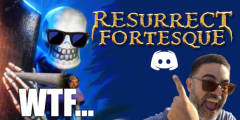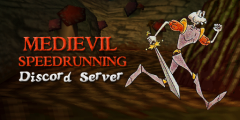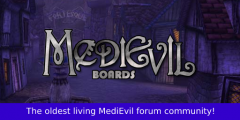MediEvil: Resurrection
| MediEvil: Resurrection | ||
|---|---|---|
| [[Image:<tabber>
PAL=
File:MediEvilResurrectionPSP1183 f.jpg|250px]] | ||
| Tagline(s) | The realm of Gallowmere needs a hero. | |
| Platform(s) | PlayStation Portable, PlayStation Network | |
| Ratings | ESRB: Teen PEGI: 7+ OFLC: G8+ | |
| Mode(s) | Single-player, multiplayer | |
MediEvil: Resurrection is the latest installment in the MediEvil series. It is a reimagining of the original MediEvil. It was released as a launch title for the PSP on September 1 2005, in Europe and on September 13 2005, in the United States. The game was released as a platinum title in Europe on June 2 2006. It was made available for download from the PS Store in Europe on May 29 2008, and in the United States on June 26 2008.
Differences from MediEvil
The game features many alterations to the original structure and content, such as the "Anubis Stone" sub-plot which never appeared in the original. Many things such as level design and characters were changed drastically, and some levels from the original were removed altogether. New levels and characters were introduced, the cutscenes are completely original, and the game was given a much more comical, cartoon-like style as opposed to the Gothic horror of the original. The soundtrack is also completely orchestrated, and half of the themes from the original were removed while new themes were created to fit with the new levels. Also, unlike the original, there is no alternate ending; Dan still goes to the Hall of Heroes regardless of whether he collects all of the chalices.
Gameplay
Gameplay is similar to that of the original game. Dan can utilise a variety of weapons, including melee weapons such as swords and axes and ranged weapons like throwing daggers and crossbows. If Dan defeats enough enemies to collect the Chalice of Souls hidden throughout each level, he will be able to travel to the Hall of Heroes where a legendary hero will reward him with a new weapon or other helpful items. Dan possesses a single life bar throughout the game, which can be sustained by collecting Life Bottles throughout the game which can be replenished by energy vials and Life Fountains. The PSP version also includes some exclusive minigames which can also be played using local multiplayer.
Characters
- Sir Daniel Fortesque - The captain of the guard who fell in the first wave of arrows at the Battle of Gallowmere. He was resurrected by Zarok 100 years later and has been given a chance in death to prove himself to be the hero he never was in life. He is voiced by Jason Wilson.
- Zarok the Sorcerer - Evil sorcerer who was once part of King Peregrine's retinue and was banished for meddling with the dead. Defeated at the battle of Gallowmere, he returned 100 years later to plague Gallowmere once again. He is voiced by Paul Darrow.
- Al-Zalam - A powerful Genie from the east whose powers were stripped by Zarok, now a bothersome squatter in Sir Dan's skull. He offers advice to Sir Dan and tries to pull off jokes when he gets the chance.
- Death - The Grim Reaper himself appears in the game. He is extremely frustrated with Zarok's raising the dead all over, making his job quite difficult. He is fond of Sir Dan and is sort of a father figure to him. He is voiced by Tom Baker in the English version of the game.
- Heroes - Canny Tim, Stanyer Iron Hewer, Bloodmonath Skull Cleaver, Woden the Mighty, Karl Sturnguard, Dirk Steadfast, Prince Ravenhooves the Archer, Imanzi Shongoma and Megwynne Stormbringer, all aid Dan in his quest by giving him their weapons and other useful items.
Plot
Template:Spoilers In 1286, an evil wizard named Zarok sought to take over the Kingdom of Gallowmere. Legends tell of a brave knight named Sir Daniel Fortesque who slayed the evil wizard and brought peace to Gallowmere. In actuality, however, Dan was the first to die in the Battle of Gallowmere, struck down by an arrow in the eye during the first charge. A century later, in 1386, Zarok returns and casts a spell over Gallowmere, robbing the souls of its people and raising the dead. This spell also resurrects Dan, who is accompanied by Al-Zalam, a genie who was robbed of his powers by Zarok and cursed to reside in Dan's skull. Seeing his resurrection as a chance to prove himself a true hero, Dan goes on a quest to seek revenge against Zarok, collecting pieces of an artifact called the Anubis Stone along the way.
After collecting all the pieces and making his way to Zarok's lair, Dan is confronted by Zarok and his immortal army, but Dan manages to stop this army by using the Anubis Stone to summon the souls of those who fought in the Battle of Gallowmere. Zarok transforms into a cobra as a last-ditch attempt, but Dan manages to defeat him. As Zarok perishes, he causes his lair to collapse in the hopes of taking Dan down with him, but Dan is saved by Al-Zalam, who had been freed from his curse upon Zarok's demise. As peace returns to Gallowmere, Dan returns to his eternal rest, where he finally earns his place as a true hero in the Hall of Heroes. Template:SpoilerEnd
Development
Development of MediEvil: Resurrection began in 2003. Despite the success of the original, the PSP game was not created by Chris Sorrell or the original PS1 team. Sorrell had stressed to his studio management that he would love to direct the PSP game and bringMediEvil up to date, but the license to the 24 (TV series) had become available to Sony and he was instead instructed to direct the video-game adaptation 24: The Game. Since the release of MediEvil: Resurrection, Sorrell has expressed disappointment with the changes to the game and the fact that his superiors did not allow him to direct it.
Piers Jackson was instead appointed as the director for MediEvil: Resurrection. Mitch Phillips, who was the character animator for the previous two installments, was appointed as lead artist for the game. He and the soundtrack composers, Bob and Barn, were the only people from the original team to return. According to Piers Jackson, the thrust of the design was to produce a title that could showcase the full abilities of the PSP, including its built-in Wi-Fi capabilities. Jackson also stated that everything about the game was different from the original MediEvil. Whilst they had taken the basic story and some of the locations from the original game, all the code, graphics and voices were different and they expanded the plot, added mini-games, multiplayer facilities and a PSP-friendly save anywhere function. He also said that they had preserved ideas that they thought worked well in the original, though their use had been altered or repositioned to keep the game fresh even to those who had played the original. The addition of the Anubis Stone sub-plot was to strengthen the story arc and the creation of Al-Zalam was to act as Dan's internal monologue and the player's guide.
Cover art
<tabber> PAL (European)=
- Pictures GIA GPP GIASONGPP0044 2.jpg
Front and back cover.
- Medievil ressurection cover scanned by bjmcentral-d4pws90.jpg
Platinum cover.
|-| NTSC (American)=
- Medievil Resurrection COVER.jpg
Front and back cover.
- Mapofgallowmere.jpg
Inlay
</tabber>
Soundtrack
- Main article: MediEvil: Resurrection OST
The music in the soundtrack is split into two halves. The cues from the first half are largely reminiscent of a select number of cues from the original game (1 track from the second game was also used), with the addition of extra thematic elements to strengthen and tie them together. The other half of the music is totally original, and written exclusively for this iteration of the franchise. All the music was performed live. The orchestra consisted of around 80 players and was made up of members of the Prague Philharmonic and recorded in Prague on the Barrandov Recording Stage. In addition the score benefits from a 32 piece choir, also recorded in the same venue.
Tracklist
| # | Track title | Composed by | Length |
|---|---|---|---|
| 1 | "Welcome to Gallowmere" | Andrew Barnabas, Paul Arnold | 6:07 |
| 2 | "The Spell" | Andrew Barnabas, Paul Arnold | 4:37 |
| 3 | "Home of the Dead" | Andrew Barnabas, Paul Arnold | 6:32 |
| 4 | "A Fiery Confrontation" | Andrew Barnabas, Paul Arnold | 4:15 |
| 5 | "Comedy Corpses" | Andrew Barnabas, Paul Arnold | 2:21 |
| 6 | "Gallowmere Waltz" | Andrew Barnabas, Paul Arnold | 4:07 |
| 7 | "Hall of Heroes" | Andrew Barnabas, Paul Arnold | 2:15 |
| 8 | "Village of Madness" | Andrew Barnabas, Paul Arnold | 4:09 |
| 9 | "Hilltop Mausoleum" | Andrew Barnabas, Paul Arnold | 3:34 |
| 10 | "Scurvy Docks" | Andrew Barnabas, Paul Arnold | 2:16 |
| 11 | "George the Pumpkin" | Andrew Barnabas, Paul Arnold | 4:15 |
| 12 | "Wheat Demons" | Andrew Barnabas, Paul Arnold | 4:09 |
| 13 | "Zarok's Lair" | Andrew Barnabas, Paul Arnold | 1:49 |
| 14 | "A Hero Returns" | Andrew Barnabas, Paul Arnold | 3:36 |
| 15 | "End Titles" | Andrew Barnabas, Paul Arnold | 3:14 |
Reception
| Reception | |
|---|---|
| Aggregate scores | |
| Aggregator | Score |
| GameRankings | 68.96%[1] |
| Metacritic | 66/100[2] |
| Review scores | |
| Publication | Score |
| Edge | 5/10 |
| Electronic Gaming Monthly | 6.2/10[3] |
| Eurogamer | 4/10[4] |
| GameSpot | 6.1/10[5] |
| GameSpy | Template:Rating[6] |
| IGN | 7.3/10[7] |
MediEvil: Resurrection received mixed reviews upon release. The game holds average rankings of 66 on
[8] and 68.96% on
[9]. General complaints from reviewers were directed at the camera control, which was cited as being particularly poor during combat sequences, as well as occasional frame rate drops. The combat was also criticized for its awkward hit detection.
gave the game a 7.3, praising the graphics, soundtrack, and content but said that the fighting mechanics needed work.[10]
gave the game a 6.1, stating "The game hasn't aged well, and although it has plenty of personality, the maddening camera control and broken combat mechanics quickly spoil the fun".[11] GameCritics was one of the harshest reviewers, giving the game a score of 4/10 and stating "I honestly do think that Sir Daniel Fortesque is a good character with potential, but I would have much rather seen an all-new game with a nod towards current methodology than a rehash of something that honestly wasn't all that great in the first place".[12]
Chris Sorrell and Jason Wilson, co-creators of MediEvil, have also expressed disappointment with the game. Neither of them had any involvement with MediEvil: Resurrection, and when they were asked about the game during an interview with RetroGamer, Jason Wilson said, “It was a strange feeling to see something you loved being remade by others. I now know what all those directors feel like when their movies are remade.” Chris Sorrell said that he was disappointed by the redesign of the game and how there were a number of aspects to MediEvil PSP that weren't really what he would have chosen. He did say, though, that the development team did an impressive job creating the game considering the time constraints they were up against.
The game did receive fairly high reviews from several sites. Critics unanimously praised the game’s graphics, soundtrack, voice-acting, and over-all content for the PSP. Game Over Online countered arguments by many critics, stating that although the camera issues and combat problems complicated several things, the game itself was still more than adequate as a basic platformer and awarded it with 77%.[13] Gaming Illustrated gave it an 8.2, saying that it was a solid title whose best features include the humor, story, and amount of modes the game had to offer.[14]
Gallery
Screenshots
- Screenie1.jpg
- Screenie2.jpg
- Image3.jpg
- Screenie4.jpg
- Image5.jpg
- Image6.jpg
- Image7.jpg
- Image8.jpg
- Image9.jpg
- Image10.jpg
- Image11.jpg
- Image14.jpg
Videos
- Video:Game Trailer
Game Trailer
- Video:E3 2005 Interview
E3 2005 Interview
Trivia
- The game was one of the very first to support the gamesharing feature.
- MediEvil: Resurrection is the first and only MediEvil game with a single ending.
References
- ↑ http://www.gamerankings.com/psp/920782-medievil-resurrection/index.html
- ↑ http://www.metacritic.com/game/psp/medievil-resurrection
- ↑ http://www.accessmylibrary.com/article-1G1-135279431/medievil-resurrection.html
- ↑ http://www.eurogamer.net/articles/r_medievil_psp
- ↑ http://www.gamespot.com/medievil-resurrection/reviews/medievil-resurrection-review-6133032/
- ↑ http://psp.gamespy.com/playstation-portable/medievil-psp/654712p1.html
- ↑ http://www.ign.com/articles/2005/09/13/medievil-resurrection
- ↑ http://www.metacritic.com/game/psp/medievil-resurrection
- ↑ http://www.gamerankings.com/psp/920782-medievil-resurrection/index.html
- ↑ http://www.ign.com/articles/2005/09/13/medievil-resurrection
- ↑ http://www.gamespot.com/medievil-resurrection/reviews/medievil-resurrection-review-6133032/
- ↑ http://www.gamecritics.com/book/export/html/3044
- ↑ http://www.game-over.com/reviews/psp/MediEvil_Resurrection.html
- ↑ http://gamingillustrated.com/medievil-resurrection-psp/
External links
Gaming Wiki Network
 Discord • Twitter |
The GWN is an affiliation between independently-hosted wikis about video games. | ||
|
We are also affiliated with:
| |||





